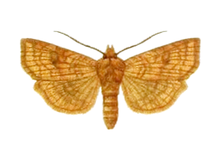| Xestia | |
|---|---|

| |
| Xestia ochreago, the type species | |
| Scientific classification | |
| Domain: | Eukaryota |
| Kingdom: | Animalia |
| Phylum: | Arthropoda |
| Class: | Insecta |
| Order: | Lepidoptera |
| Superfamily: | Noctuoidea |
| Family: | Noctuidae |
| Subtribe: | Noctuina |
| Genus: | Xestia Hübner, 1818 |
| Type species | |
| Noctua ochreago Hübner, 1790
| |
| Diversity | |
| Probably over 100 species (but see text) | |
| Synonyms | |
|
Numerous, see text | |
Xestia is a genus of noctuid moths (family Noctuidae). They are the type genus of the tribe Xestiini in subfamily Noctuinae, though some authors merge this tribe with the Noctuini. Species in this genus are commonly known as "clays", "darts" or "rustics", but such names are commonplace among Noctuidae. Xestia moths have a wide distribution, though they most prominently occur in the Holarctic.
With almost 200 species included at one time, Xestia was something of a "wastebin genus". But almost half of the traditional species are now placed elsewhere (see below), and some of the remaining ones are liable to be assigned to another genus also. On the other hand, new moths that probably do belong in this genus are still being discovered (e.g. X. hypographa, which led to the 2002 transfer of X. ornata from Eugraphe to here). Thus, unless there are drastic taxonomic changes in the future, Xestia is likely to remain one of the larger noctuine genera.[1]
- ^ Varga & Ronkay (2003), Pitkin & Jenkins (2004), and see references in Savela (2009)